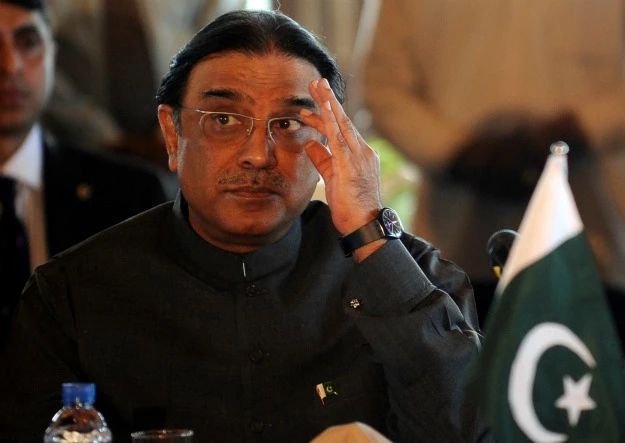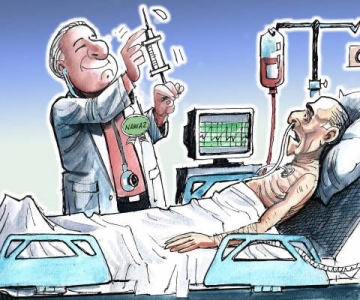By all statistical estimates and anecdotal evidence, Pakistan’s middleclass has grown during the last decade. The visible manifestation of this historically significant trend was the spontaneous outrage at the dismissal of the chief justice in 2007 and the robust movement that followed. However, the other side of this sociological transformation has been the capture of the “opinion” in Pakistan by the overdriven urban middleclass segment now backed and voiced through a powerful and not always responsible electronic media.
Amid the torrential attacks and doomsday predictions on Asif Zardari’s candidature for presidency, a few reasoned voices have attempted to remind the country that fortification of a fractured democratic process requires civilian ascendancy. No, say our wise ones. They are enraged at the corruption tales, and media and real trials. There is a deafening silence over the fact that without a single conviction an accused has spent 11-and-a-half years in jails and suffered solitary imprisonment, torture and pressure that could have easily broken a common back. Admittedly, our president-to-be is hardly an angel. But this is not about morality or middleclass affront or even a thousand stories of international media that have suddenly become so credible. Not long ago, the vanguard of middleclass morality were telling us how biased the international media is about Musharraf and how twisted its reporting was on the US-led war on terror. All of a sudden Zardari tales have become legit, true and worrying.
Predictable, and trite beyond belief. To use a line from Kishwar Naheed’s poem: “if you wanted to spin a story, you ought to have tried a fresh one.” What is this urban hate-mongering all about? Mosharraf Zaidi has attempted in his two pieces printed on these pages to unpack this riddle rather adroitly. For good reasons he placed the disconnected, drawing-room politics at the centre of his argument. But there is much that is invisible to the eye and locked in the depths of history and anthropology.
Not surprisingly, it is all about power. Zardari, soon to be President Zardari, happens to be the only prominent political player whose source of power was and now will always be linked to a woman. Benazir may not have been the best of administrators and warriors but she remained a symbol of political legitimacy for thirty years of her political career. Her life and times, when the historian will venture to analyse, will have to narrate the patriarchal biases and the embedded misogyny of South Asian cultures.
Thus the blood-thirst for Zardari is quite intense: his out of proportion vilification campaign, during the last fortnight, has beaten the hatred index for good old General Musharraf. I am no fan of Mr Zardari; it is too early to make a judgement on his leadership qualities. But I wonder why such fuss has erupted? The fact that he draws his status outside the bounds of patriarchy; and that the endemic misogyny of Pakistani society is challenged each time he takes a decision could help us understand the dynamic better. Of all the surreal charges, that a man outside Pakistan could orchestrate a conspiracy to kill his wife to seek power, takes the cake. Well, this only confirms the latent urge for misogyny and affirmation of domestic violence culture at a grander scale.
I am appalled when the recent converts to constitutionalism and rule of law argue that 11 or more years’ imprisonment for Zardari was well deserved. In a way this warped discourse puts the NAB architects to shame. The Generals merely legislated that unless proved innocent, an accused remains guilty. Our civilian friends urge that not only that Zardari remains guilty but his right to contest the presidential election should be suspended or, worse, snatched. When you have urbane and educated people with such views, NABesque laws, some would say, suit us rather well.
The late Benazir Bhutto’s personal life in a classic misogynistic manner was shuffled by men of our times. It was ensured that she perennially suffered at least in the personal domain if her detractors could not do anything about her public profile and political base. Thus, the villainous husband was kept locked for most of this time; accused of killing her brother, cited as the reason for her downfalls and destruction of the Bhutto legacy. Her death, and the way the site of the murder scene was washed away was all reminiscent of the way a combination of patriarchal power operates through violence. However, her near-deification in Sindh and the contested will led to Asif Zardari’s ascension and capture of a matrilineal power-base directly in confrontation with the hold of power with an overly masculine identity of power in Pakistan. Uncannily, the PPP’s rhetoric on forgiveness, reconciliation is essentially “feminine,” compared to the rigid application of “principle,” honour of agreement, and aggression from other mainstream political quarters.
It is from this perspective that we can understand better the ongoing campaign about Asif Zardari’s dubious credentials for the presidency. In a country where swindlers, thugs, Constitution-twisters and vulgar-rich continue to shine and enjoy power with respectability, the moralistic histrionics against Zardari appear so out of place. Patriarchy ensures that all black is transformed into white, unless, of course, if its power-sharing centre lies outside its orbit. Evidently, Asif Zardari is better known to be the widower of a larger-than-life woman and not a son of an ex-general, politician or bureaucrat.
Zardari’s power distance from the core is further compounded by his persecution at the hands of the power nexus otherwise known as the clichèd establishment. To add fuel to the fire, he has the three small provinces firmly behind him. In the tribal scheme of things, he is a male representative of the smaller province so it ironically works out well for Zardari. But for the old power centres, now joined in by the corporate media, the outcast will remain at the margins.
Those who are not tired of citing morality-laden, principled politics as the converse of Asif Zardari forget that the only conviction that materialised against him was nothing but a farce. That particular sentence by the Lahore High Court had to be reversed by a “PCO Supreme Court” due to the tapes scandal revealing the hapless High Court judges were afraid of ruling politicians who could hang the judges “upside down.” The characters of that tape remain oddly familiar. However, the unfamiliar pattern was Asif Zardari’s willingness to work with one as Musharraf’s legal eagle and the other as a coalition partner. This display of tolerance and forgiveness goes against the feudal and tribal revenge code.
While the chatterati of Pakistan will remain disengaged from the real politics, it is for Punjab to carefully consider what the three provinces are articulating. Aside from all other arguments, it should be remembered that Pakistan is a tenuous federation and needs to steer out of its unfortunate historical baggage. Above all, it is time that federal politics reclaims the presidency and the bitter lessons of 1988-99 decade are not repeated to create another tragic farce.
A Zardari presidency will be a triumph of representative politics. It is time we accept the principle and let things take their own course in the decades-long democratic journey to follow.



